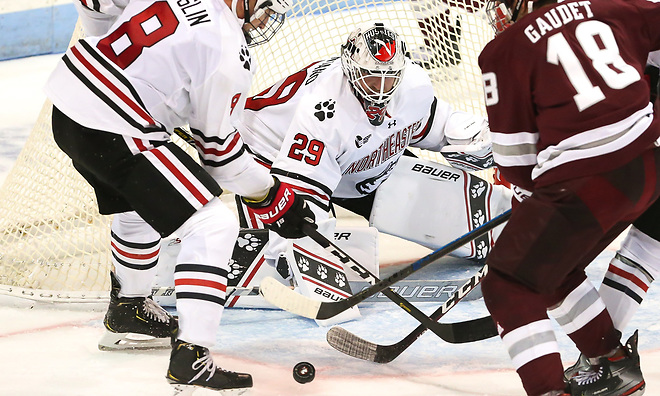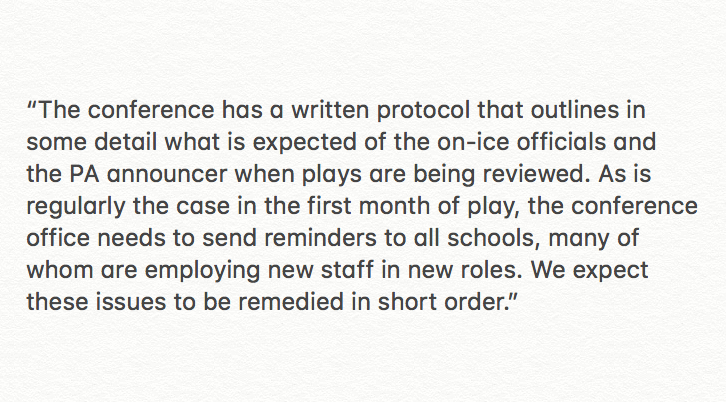
Last February, Northeastern coach Jim Madigan was dealt news that was more than a cause for concern, as it impacted the short-term future of his program.
Though maybe not surprising, it was unwelcome to find out that standout goaltender Cayden Primeau would not be returning in 2019-20 for his junior season as instead, he would sign a professional contract.
The reality was, Madigan didn’t have any goaltender with experience to take Primeau’s place, despite having a team returning up front this season that had plenty of talent and ability.
Could goaltending, something that has been so strong during Madigan’s tenure, suddenly become this team’s Achilles heel?
Leave it to what has no become pretty famous in college athletics, the transfer portal, to save the day.
Craig Pantano, who was recruited at Merrimack by Mark Dennehy but now was playing under Dennehy’s successor Scott Borek, decided to test the transfer waters. Pantano had already earned his degree with one full season of eligibility remaining and could transfer as a graduate student anywhere in Division I without having to sit out a season like a typical college transfer.
“As we were starting to look [for a replacement for Primeau], we couldn’t get goaltending that we thought was going to give us an opportunity,” said Madigan.
“In early March, we found out Craig was going to be available. The fact that we were able to attract a goaltender who has won in this league, who has been into every building and, for the most part, has won, has won a playoff series, that was important for us.”
Madigan said he knew this year’s team was going to be somewhat young, having also lost standout defenseman Jeremy Davies. But he also felt that there were enough pieces in place to have some sort of continuity of success for a team that has made two straight NCAA tournaments, won back-to-back Beanpot tournaments and last year took home the Hockey East tournament title for the second time in four years.
“We knew we’d have some freshmen in the lineup, freshman defensemen, to have someone with experience [in goal] was important,” said Madigan. “He’s been good. He made the saves he needs to make.
“We don’t need him to be Cayden Primeau, we need him to be Craig Pantano.”
Thus far, Craig Pantano is plenty good. After a 3-1 upset of No. 4 Massachusetts in Northeastern’s Hockey East opener on Tuesday, the Huskies are now 3-0-0 on the young season. Pantano has been in net for all three games and has allowed just a single goal in each of his three starts.
That puts the Huskies in a solid position early. Particularly given the fact that the offense hasn’t exactly been gangbusters in its production – Northeastern has scored two goals in each game, excluding an empty-net goal on Tuesday – solidifying the backend has been paramount.
If Pantano continues to be successful for this Huskies team, he will join what is now a line of goaltenders to take on an elevated status of success while wearing the black and red for Northeastern.
Obviously, Primeau was one of the best as the predecessor. But prior to him, Ryan Ruck won the school’s first Hockey East title in 18 years back in 2016. Prior to him was Clay Witt, who began his career under coach Greg Cronin but emerged as a stalwart, posting a 17-12-3 mark in 2013-14, giving more than a glimmer of hope in Madigan’s early years that the Huskies could be moving in the right direction.
And while Madigan has been one constant through this era of goaltending success, so too has been goaltending coach Ed Walsh.
Walsh, who began his collegiate career at UMass Lowell helping turn Dwayne Roloson into an All-American in 1994 prior to Roloson’s 20-year professional career, has been successfully helped build the career of numerous student athletes at Lowell, Dartmouth and now Northeastern.
“He’s a calming influence,” Madigan said of the veteran goaltending coach. “He understands the position from a mental, philosophical perspective and the technical standpoint.
“He doesn’t try to change [a goaltender’s] style. He works with it. He sees where the areas of strengths are, where the areas of improvement are needed. He goes and attacks it with them.
Madigan likes Walsh’s approach from a geometric aspect, complimenting his ability to teach goaltenders angles and positioning. When you watch an Ed Walsh product, being positionally sound is typically one of the characteristics.
“He’s been really good at refining [goaltender’s] games,” Madigan said. “All of these goaltenders have their own goaltending coaches. Some have two of them. Eddie has been able to work with the goaltenders and knowing and communicating through the goalie coaches what the strengths and weaknesses are coming in, and he’s been able to work with them to make them better.”
Upset of the Week
There won’t be a lot of opportunities for a Hockey East team to go into the No. 1 team in the nation’s barn and take two points away.
For UMass Lowell, that was the situation this weekend as an opportunistic second period where the River Hawks scored three goals off Minnesota Duluth mistakes combined with a stellar goaltending performance by Tyler Wall led to the upset of the top-ranked Bulldogs.
In reality, it could have been two victories over the nation’s top team for Lowell. On Saturday, the River Hawks and Bulldogs were tied at 1 early in the third before host Minnesota Duluth scored the game-winning goal. In honesty, Minnesota Duluth was the better team on Saturday and earned the win, but it was a positive sign for the River Hawks to earn the weekend split and improve to 3-1-0 on the season heading into their Homecoming Weekend series with Colgate.
Lowell’s coach Norm Bazin called the weekend at test prior to Friday’s game. After the Saturday loss, he was comfortable surmising his team’s results.
“We stuck in there with a very good team and that’s a positive for a young club,” said Bazin. “That said, next weekend will be a different challenge from a different team.”
An area with the potential for improvement for Lowell is the power play, which went 0 for 9 at Duluth and is now 1 for 17 (5.9%) through four games.
“I thought we did better on the power play [on Saturday],” said Bazin. “Overall I liked the movement, I liked the chances, we just didn’t score.”
Replay Redux
If anyone had a chance to watch the UMass-Northeastern game on Tuesday night, the most prominent game of the opening weeks to be shown on the league’s broadcast partner, you know that highly thought of NESN color analyst Billy Jaffe was none too happy about constant interruptions in the game’s third period for stoppages related to video review.
The first came at the 6:48 mark of the third period when UMass scored a goal to cut the lead to 2-1. Referees Terrence Murphy and Cameron Lynch went it to review what most believe was a potential major penalty at the other end of the ice, possibly as much as a half minute before the goal.
Shortly thereafter, there was another review. The subject of which wasn’t obvious as it came after a scrum in front of the Northeastern net.
A third review was used late in the game, with a little more than three minutes left on a play that appeared to be a clear spear by Northeastern’s Brendan van Riemsdyk.
Of those three, the only penalty went to van Riemsdyk, someone the referees seemed prepared to already call on the ice. The other two incidents, despite taking a combined total of nearly 12 minutes to review, didn’t result in fouls.
Why do I bring this up? Mostly because, as Jaffe emphatically said on the broadcast, I agree that there are significant issues with video review in college hockey right now.
“We can’t quite tell what they’re looking for,” said NESN’s Tom Caron about the review following the UMass goal, the first of the three reviews.
“This is the issue I have with college hockey. There’s should be a [public address] announcement exactly what they’re looking for,” responded Jaffe. “We’re not getting word from the penalty box what they’re looking for.”
Jaffe guessed maybe the play was, at one point offside. It wasn’t for nearly three minutes that he figured out that maybe there was head contact, but even as a fan at home, that was disputable as it seemed that maybe the officials were reviewing a potential knee-on-knee hit nearly a minute before the goal.
The reality is that instant replay in its current state is possibly being overused.
Yes, this is a fast game and yes, calls will be missed, even with four sets of eyes from the respective officials.
But as replay has been expanded, it was mostly believed that reviewing a potential penalty that all officials missed typically would be triggered by an injury. In both cases on Tuesday, there wasn’t a player down on the ice that should have alerted the reviews.
I’m all for getting the call right, but if reviews take too long, the game itself become compromised. On Tuesday, the third period took an elapsed time of 41 minutes, 45 seconds to play. More importantly, in an excellent early-season college hockey game, the flow was lost and that was apparent on the ice.
Editor’s note: After submission, the following statement was released by Hockey East commissioner Joe Bertagna:
